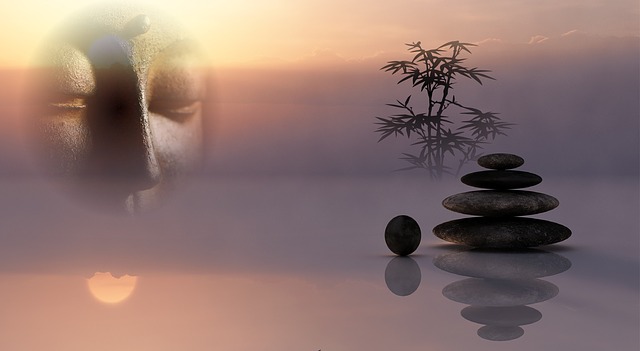Are You Looking to Spiritual Practice When You Should Be Seeking Therapy?

The suffering that exists in each of us and in the world comes about through causes and conditions that we can find the root of if we take the journey of discovery. What we learn in Buddhism is that there is pain and there is suffering. Suffering is the stories that we add on top of pain.
That is very simple. Pain, specifically psychological pain or trauma, is distinct from suffering. It is the wound that needs healing and that should be attended to by a professional that works with whatever kind of trauma or issues you may need healing or resolution for.
While spiritual practice can certainly help us along on our journey, and most certainly and help us endure whatever pain we are experiencing, with this basic knowledge of what spiritual practice id and what it isn't, we can parse out the two and attend to what needs therapeutic intervention. Having said that, mindfulness can assist us as we search for the cure to our ills and move toward wholeness. The two co-exist.

Trauma is a Wound
If you had a deep cut on your leg that needed stitches you would go to the doctor. You would not go to meditation and bleed all over the place. I'm being a bit facetious here but I am trying to illustrate the difference and this is something very important to understand. Many people turn to spiritual traditions hoping that their deep emotional wounds will be healed by practice. They are also attracted to the promise of "no-self" or the annihilation of the ego. They identify with the guru or teacher and idealize them and the hope of being set free of their emotional pain through this association. It's a type of narcissism where they fantasize that they will be above all there former woes, part of a "special" group of people, connected to a "special" teacher and are "spiritual." People on this kind of an ego trip are not empowering themselves making themselves vulnerable. This is how problems arise in spiritual communities where teachers take advantage of students and students give their power away.
By contrast, real spiritual practice will empower you rather than disempower you. You will see things clearly and se things in their proper place. You will know when to go to the doctor and you will know when your mind is running away with itself and you need to engage in mindfulness. Real spiritual practice is also in no hurry. In the realm of moving through conditioning it takes as long as it takes. That's why slowing down in all things is always the best course of action. This is mindfulness.
What do you think?

@soulsistashakti is a musical artist and writer based in NYC as well as a practitioner of Buddhist teachings. You can check out my music on my FB artist page at https://www.facebook.com/soulsistashakti
Recent posts
Buddhist Wisdom: From Taking Things Personally to Responding Skillfully and Attaining Mastery
Buddhist Wisdom: When Lightning Strikes It’s Not Personal
The Buddha Was Just a Guy Who Got Woke – The Parable of Two Arrows
While I am a great believer in the fields of psychology and psychiatry, I am not sure that psychological pain as a result of trauma or otherwise is fundamentally different from other types of pain.
At its root, trauma and psychological pain often result in feeling unmoored, wishing for permanence and stability in an impermanent world, yearning for feelings of attachment and unconditional love, desires and cravings for the innocence we once felt before a sudden loss/shock/upheaval, or a desire for the innocence and happiness we never felt and normal childhood we never experienced because of our traumatic histories. It seems like these cravings form the root of the psychological pain and confusion, and our unrelenting search to satisfy these cravings creates suffering, and often, additional pain as we unconsciously relive our past traumas in our personal relationships and daily lives.
Perhaps it is helpful to have a therapist explain that the things that happened to us are not are fault, reduce feelings of guilt, point out repeated behavioral patterns, and explain how a traumatic event can result in behaviors that might have ensured our survival at the time of the trauma but have since become maladaptive in a non-traumatic environment. A prescription for Prazosin or Klonopin might help you sleep through the night instead of reliving your experiences through nightmares and night terrors. However, while the importance of getting enough sleep cannot be understated, these do not cure PTSD.
Talking to a therapist can help shed light on the confusing aspects of trauma, but they cannot undo the trauma that occurred nor "fix" your post-traumatic world view. To use your metaphor, they can explain the physiology of leg lacerations and validate your experience, but it's up to you to stitch up the wound using the tools they provide you.
It makes me wonder if perhaps the only way to make sense of and move past traumas is to follow Buddhist wisdom in befriending our fears and letting go of our cravings and desires.
What are your thoughts?
I actually have what is known as treatment-resistant C-PTSD. My flashbacks and body memories are a result of trauma and they are painful but they are not suffering. Pain is - I have a painful flashback experience and perhaps it causes me to act out in a non-healthy way and repeat patterns and I would be largely unaware that I am in a pattern. Until the episode is over I literally have no control (until further healing of the PTSD).
Suffering would be after the episode I become very upset with myself rather than having compassion for myself because I have PTSD. (See my blog this just happened in the last 2 weeks and I blogged about it). Suffering would be creating all kinds of stories ON TOP of periodic episodes. It would be forming delusions like "I will never get better" "What's the use" and that can spiral into more serious delusions. But they are stoppable through spiritual practice. PTSD is not stoppable through spiritual practice. Suffering is not pain. It's what's on top of it. I hope that makes sense.
I see here you said "post traumatic world view" that sounds like suffering. PTSD is the actual traumatic pain itself. That might be splitting hairs.
BTW, this is not my opinion. It is literally the Buddhist definition of suffering.
By "post-traumatic world view," I didn't mean to imply the suffering that comes from beating yourself up over having PTSD or thinking that you won't ever feel any different. I meant the view that we are in constant danger, that others are undeserving of our trust, and that we must remain hypervigilant at all times to ensure our safety.
In what ways have you found therapy helpful to you in working on C-PTSD?
Hyper vigilance - that is PTSD. Suffering would be adding stuff on top of hyper vigilance.
Therapy and medication. I don't take anti-depressants. I take Prazosin, which is a high blood pressure medication, that is for nightmares, Gabapentin for sleep along with a antihistamine - cyproheptadine - for sleep. Therapy really helps have someone to talk to because my trauma is not over. The perpetrator is still in my family's life. Buddhism helps me to drop it after I'm done talking about it rather than ruminating about it.
I don't have hyper vigilance anymore and I attribute that to sticking with therapy for 30 years. It takes long time.
Through spending time practicing you learn how to make the distinction. It is very confusing if you aren't practicing because everything seems like it falls under the same category and it doesn't. Which is why I wrote this. It can work the other way around as well. Depends on what side of the coin you realize it first.